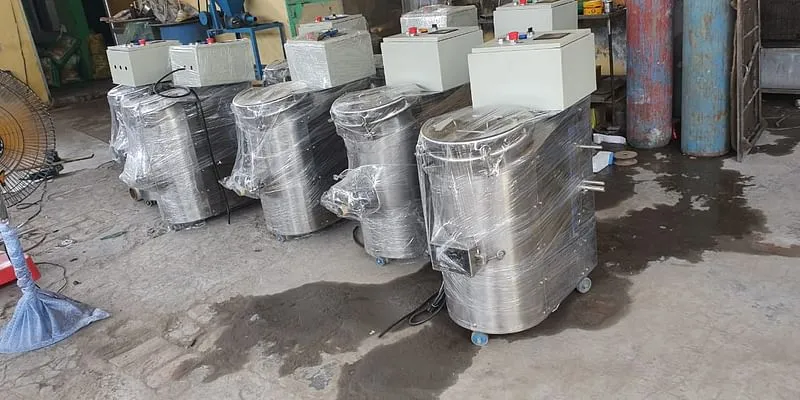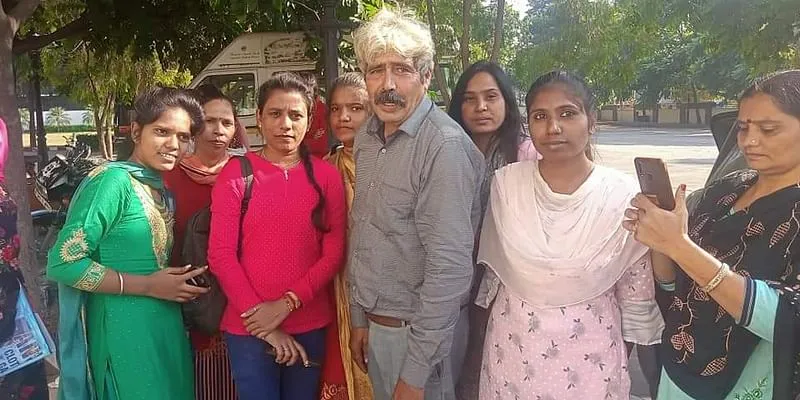Once a rickshaw puller, this farmer-entrepreneur built a multipurpose food processing machine that sells globally
From a rickshaw puller to an organic farmer and innovator, Dharambir Kamboj survived the odds to reach where he is today. His company, Dharambir Food Processing, clocks an annual revenue of Rs 67 lakh.
Dharambir Kamboj was in his early teens years in the 1970s when the financial hardships of the family forced him to stop studying.
Hailing from village Damla in Yamunanagar, Haryana, Dharambir then looked after his family’s farm and herbal plantations. But that wasn’t helping him earn enough to support the family needs and the medical treatment of his ailing mother and sister.
Dharambir continued working in his farmland for a couple of years but that didn’t improve his financial condition.
“My mother succumbed to her illness. My sister needed treatment to survive but we had no money. My daughter was also born at the same time and I was in dire need of money to even make ends meet,” says Dharambir in an interaction with SMBStory.
The man struggling to meet basic ends at one time is now selling his patented machines to 15 countries and making an annual revenue of Rs 67 lakh.
But how did he come so far? Dharambir credits it to resilience and a strong assertiveness.
From rags to riches
Dharamir moved to Delhi in the early 80s to find a job. But without a degree his efforts were in vain, and he took up odd jobs to feed himself.
“When I could not find anything, I started ferrying people in a rickshaw in Khari Bawli area of Delhi.”
Eventually, Dharambir noticed that some of the passengers he used to ferry were paying hefty amounts of money for buying processed fruit products from Delhi’s local markets.
“That surprised me,” says Dharabmir, adding that in his villages these fruits were grown in large amounts and were sold at throwaway prices. Why are these being sold at such a huge amount? He also caught sight of products made from fruits, such as jams and puddings which were sold at a high price.
This phase of life helped Dharambir understand the booming market demand for herbs, fruits, and extracts.
Dharambir continued his profession as a rickshaw puller, until he met with a road accident in 1987. He was seriously injured and bed-ridden, but, undeterred by adversities, Dharambir chose to come back to his village and resume farming.
But the thought of fruits and extracted products being sold at hefty prices in Delhi stayed with him and he began his research.

Dharambir Food Processing Machine
Over the years, he began a number of experiments related to organic farming, and later on set up a small farming laboratory on his land.
His innovative work in mushroom farming, vermicomposting, and other farming methods won him many accolades. His farming of strawberries and other rare fruits in the fields of Haryana gave him further recognition.
In 2004, Dharambir got an opportunity to visit Rajasthan through the Horticultural Department of Haryana. During this visit, he interacted with farmers to learn about the aloe vera crop and its extracts for obtaining medicinal value products.
After returning to his village, Dharambir was looking for ways to market aloe vera gel and other processed products as a lucrative venture. In 2002, he met a bank manager who educated him about the machinery required for processing food products, but quoted Rs 5 lakh for the machine.
“The pricing was exorbitant but I didn’t give up and thought of developing the machine in-house. After an investment of Rs 25,000 and an effort of over eight months, my first prototype of the Multipurpose Processing Machine was out,” Dharambir says.
There was no looking back after that.
Creating social impact
Designed and developed by Dharambir’s inputs, the Multipurpose Processing Machine has gained widespread recognition and fame as a first-of-its kind, portable, user-friendly machine that can be used for various functions such as pulverising, mixing, steaming, pressure-cooking and juice/ oil/ gel extracting. It can process more than 100 varieties of fruits and herbs.

Dharambir with members of a women's self-help group
He also got a patent for this machine by the National Innovation Foundation.
By selling these machines pan-India and across 15 countries including the US, Italy, Nepal, Australia, Kenya, Nigeria, Zimbabwe, Uganda, Dharambir supports fellow farmers and rural micro-entrepreneurs to get better profits by processing fruits and herbal crops grown by them.
He has also organised workshops and training programmes on how to operate the machines for more than 7,000 people across the country. Out of these, more than 4,000 were women.
Challenges and the way forward
COVID-19 was one of the biggest challenges Dharambir faced. There were financial and logistical challenges and production came to a halt. It was difficult to even communicate with beneficiaries at the grassroots level.
“At this time, the support that came in from Powering Livelihoods, a CEEW-Villgro initiative, was really helpful. The financial support helped us manage our operations and the mentorship helped streamline our business plan, make machines more efficient, and increase our production capacity,” he says.
Dharambir is now looking at scaling up within India and also abroad. He aspires to see his food processing machines in at least 100 countries in the future.







